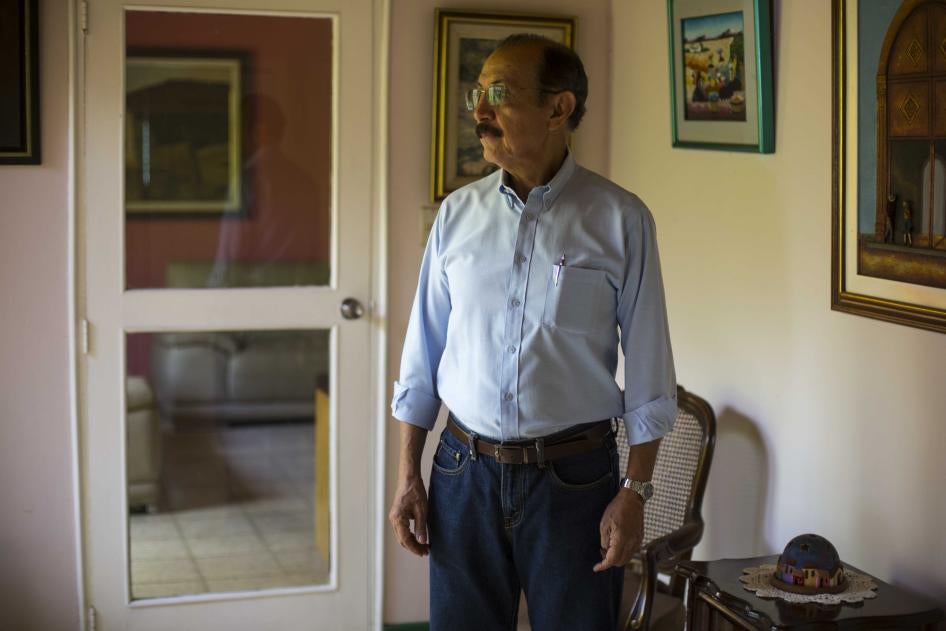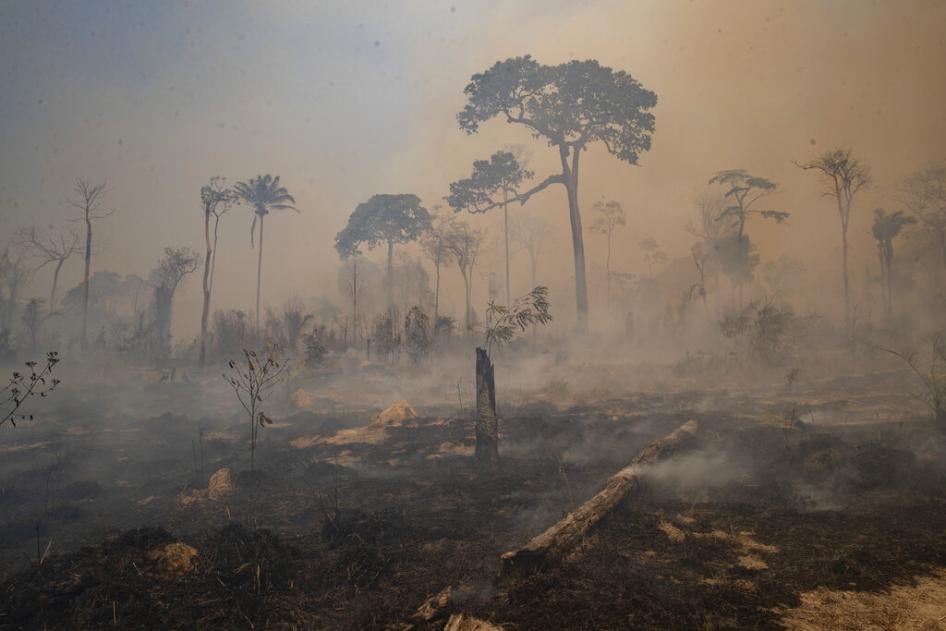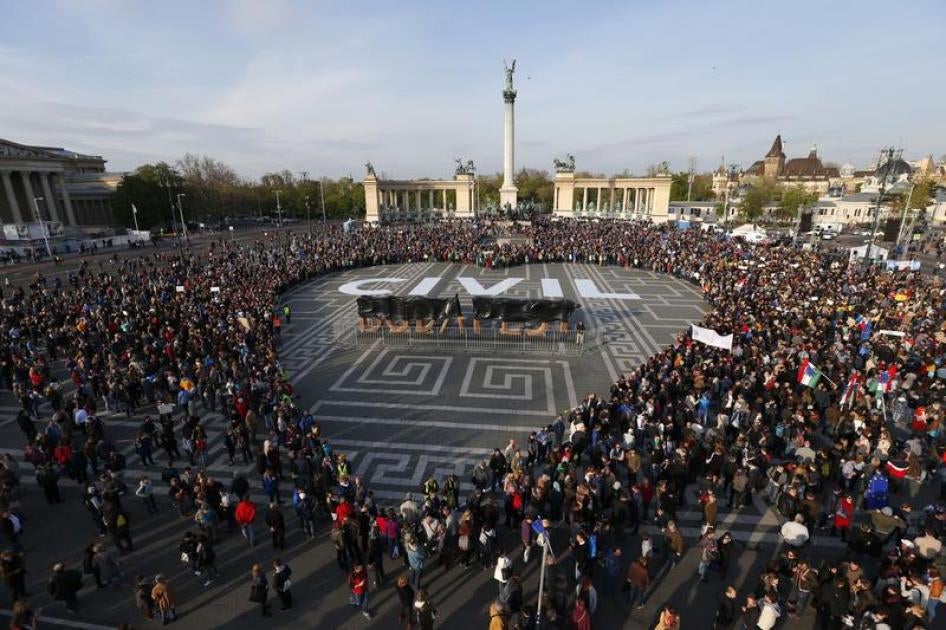Locked Away in Nicaragua: Daily Brief
- Nicaragua’s Political Prisoners;
- Burning in Amazon Accelerates;
- Hungary Officially No Longer a Democracy;
- Take Note;
- Your Questions for Our New Asia Director;
- Readers’ Top Human Rights Quotes.
By Andrew Stroehlein. Contact me at DailyBriefTeam@hrw.org and Twitter @astroehlein.
Nicaragua’s Political Prisoners
A reader got in touch last week to highlight the dire situation in Nicaragua – a human rights disaster that for years has received too little international attention.
The human rights record of the government of Daniel Ortega is appalling. Since 2018, when authorities brutally cracked down on protesters, the government has arbitrarily detained and prosecuted a range of people perceived as government critics, including journalists and political opponents. Authorities have dismantled civil society, and now they’re even going after members of the Roman Catholic Church, shuttering their radio stations and arresting a bishop and his aides.
Our reader wanted to draw attention to the more than 200 political prisoners in Nicaragua. Brutal means of ill-treatment in detention are well documented, but even just the conditions many are kept in – being held incommunicado, prolonged solitary confinement, insufficient food, no access to medical care – are so appalling that they could in some cases constitute torture in and of themselves. More than 110,000 Nicaraguans have been forced to flee.
Our reader mentioned in particular the cases of Juan Sebastián Chamorro and Félix Maradiaga, two of the seven presidential candidates detained in the context of 2021’s fraudulent elections. In March, they were sentenced to 13 years in prison for, “conspiracy to undermine national integrity.” Now, I’m not a lawyer, but I’m pretty sure that means: “running for office against Ortega.”
One hopeful sign is that international attention seems to be increasing. On March 31, the UN Human Rights Council established a new monitoring body to investigate the country’s many violations.
On August 21, Pope Francis, for the first time, expressed concern about the situation in Nicaragua. And last week, the government of President Gustavo Petro in Colombia disclosed they had been pressing privately for the release of political prisoners.
But the efforts haven’t been sufficient. More needs to be done to keep the Ortega government in check.
Burning in Amazon Accelerates
The world’s largest rainforest is on fire, and this “burning season” is even worse than last year’s.
The first week of September saw more fires in the Brazilian Amazon than in the entire month of September 2021. Last month, the fires were the worst in a decade.
These are not natural fires. They are part of an intentional – and overwhelmingly illegal – deforestation process to permanently convert forest to pastureland.
Over the past four years, the Brazilian government has been assisting this criminality by weakening environmental law enforcement agencies, undermining their ability to effectively sanction environmental crime and detect exports of illegal timber.
Who benefits? Powerful multinational businesses that source their agricultural commodities from ranchers and loggers operating illegally.
Who loses? Local communities sickened by smoke and displaced from their land, with their land rights defenders often threatened and even murdered to shut them up.
Readers may ask: how can I help?
Brazilian beef, leather, and timber sourced from illegal operations in the Amazon are laundered and sold on the legal market, and exported around the world. Your first thought may be to try to avoid certain products.
That’s fine when possible, of course, but ending our participation in this destruction is not really so much a matter of the individual purchasing choices we make. This is a large-scale problem, and the solutions have to be large-scale, as well.
It’s more about policy decisions than personal decisions. We need to push our countries’ governments to adopt and rigorously implement legislation to restrict the import of agricultural commodities linked to deforestation and rights abuses.
In other words, our political action is needed more than our shopping carts.
Hungary Officially No Longer a Democracy
We’ve been saying it for years, and now the European Parliament overwhelmingly agrees with us: “Hungary is no longer a democracy.”
With that simple phrase in a decision yesterday, legislators called for greater action on Hungary’s ever-deepening autocracy. The European Union, which likes to think of itself as a club of only democracies, may finally be facing the fact it is not.
That realization has been slow to sink in.
Four years ago, the European Parliament triggered the EU treaty’s Article 7 procedure against Hungary, which allows the bloc to deal with governments straying from the EU’s founding values. But in those four years, as EU institutions largely failed to act, Hungary’s authorities have continued to blast away at the pillars of democracy in the country.
The ruling party in Hungary has undermined the judiciary and entrenched prime minister Viktor Orbán’s rule by decree. His government has criminalized civil society, decimated independent media, crushed academic freedom, undermined women’s rights, and assaulted LGBT rights.
Yet Orbán has faced no real consequences.
The EU Commission now needs to back the Parliament’s calls to push the Article 7 procedure, and the Commission should also suspend some EU funding when media and civil society cannot operate.
Democracy, human rights, and the EU’s reputation for both are at stake.
Take Note
(curated today by Lisa Maier)
- I reported on the military’s abuses, and then I became a victim [warning: graphic content] (Frontier Myanmar)
- Philippines needs reality check from UN Human Rights Council (Lucy McKernan for Le Temps, French)
- United in a sense of victimhood: Putin banking on his friends in the Balkans to sustain his bloody war in Ukraine (The Guardian)
- Patagonia founder gives away company – new and only shareholder: planet earth (NY Times)
- US: Biden signals modest concern about Human Rights – holding back funding for Egypt is not enough (HRW)
- Bukele announces bid for reelection in El Salvador regardless of constitutional ban (El País, Spanish)
- Syrian ex-prisoners haunted by horrors of 'salt rooms' (AFP)
Your Questions for Our New Asia Director
Last week, I asked you to send me questions for our new Asia director, Elaine Pearson – about our work in the region and her priorities for the coming months and years – and I’m happy to say I received some great ones. Here are a few…
Question on Taiwan: Judith Matthews on Twitter wrote, “Congratulations Elaine. So many issues but my concern for Taiwanese sovereignty remains a priority. How can we support Taiwan’s desire to retain its democratic priorities in the face of Chinese aggression?”
Elaine replied: Foreign governments should support the reality of Taiwan as a robust democracy that generally respects human rights, while acting to address the Chinese government's rights violations, otherwise an emboldened China will expand its repression at home & abroad even further.
There should be consequences for serious violations like crimes against humanity – like targeted sanctions & a new accountability mechanism through the UN. Words of condemnation alone won't stem the tide of abuse.
Question on India: Also from Twitter, this one asked about caste-base discrimination, torture, killing, and rapes in India. What research his HRW doing on this?
Elaine replied: HRW regularly reports on caste-based discrimination in India & how people from Dalit and other marginalized communities are especially vulnerable to ill-treatment by police.
Our work on violence against women documented how women from marginalized communities face additional hurdles, for example, police resist filing their complaints or pressure them to compromise especially if the accused is from a powerful family or community.
HRW works with domestic & international groups to raise issues of discrimination on work & descent at relevant UN bodies. The intersectionality of caste, class & gender informs all our work on India.
Questions on Myanmar: We had lots of interest on Myanmar, including this on Twitter. The basic thrust of all the questions was essentially this: What can the international community do about the appalling situation there?
Elaine replied: We need action, not words on Myanmar. That means more governments should support targeted sanctions on military junta leaders & their businesses, action in the UN Security Council to prevent arms sales to Myanmar and to refer the situation to the International Criminal Court.
Finally, there was this question: With all you’ve got going on, how did you find time to write a book!?
Elaine replied: It was a pandemic project – with the lockdowns & restricted travel for two years, I had more time on my hands. I took three-months leave last year to focus on writing & then a lot of late nights & weekends. It's been a challenge. Am relieved it's out now!
Final note: For those outside Australia, Elaine’s new book, “Chasing Wrongs and Rights : My Experience Defending Human Rights Around the World” is available with free worldwide shipping here.
Readers’ Top Human Rights Quotes
I’ve been asking readers to send in their favorite human-rights-related quotes. Please email me or contact me on Twitter with your suggestions.
Today’s comes from Jill and partner Hector and Bapa Hector from Gunnundwala Country Australia. It’s by Gurrumul Yunupingu, from the chorus of his song “Gurrumul History.”:
“United we stand, divided we fall
Together we'll stand, in solidarity”


